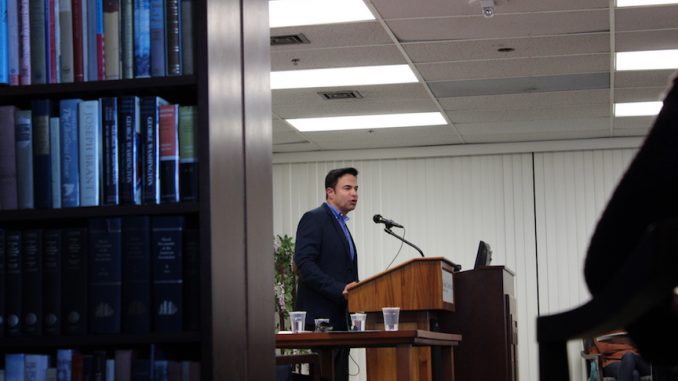
Professors across disciplines held a lecture about Puerto Rico in the College of Liberal Arts’ Dissent in America teach-in series to discuss the challenges Puerto Rico has faced since two hurricanes swept through the territory and United States’ role in securing relief for its citizens.
Panelists included Hiram Aldarondo, the chair of the department of Spanish and Portuguese, Alan McPherson, a history professor and director of the Center for Force and Diplomacy and Harvey Neptune and Monica Ricketts, who are both professors in the history department. More than a dozen students attended the lecture.
Aldarondo, whose family lives in Puerto Rico, described the humanitarian crisis on the island and argued that all Americans need to recognize that Puerto Ricans are also American citizens that are in need of help.
“I couldn’t recognize the place,” he said describing his recent visit to Puerto Rico to visit his family.
Nearly 80 percent of Puerto Rico still does not have electricity, 29 days after Hurricane Maria swept through the territory, NPR reported.
Without electricity, communication between family members has become increasingly hard for his family. Many Puerto Ricans who are separated from their families have fled to mainland America to states like Florida, with 60,000 fleeing to Florida in the last five weeks, he added.
The history of mainland America’s relationship with Puerto Rico was also discussed by Neptune, who spoke about the colonization of Puerto Rico. He told attendees to think of Puerto Rico as a state, rather than a third-world experimental colony that he claimed it had often been used as early in its existence.
During his lecture, he gave the examples of the contraceptive trials in Puerto Rico during the 1950s, which were 10 years before the Federal Drug Administration approved the birth control pills for mainland America.
Angel Betancourt, a junior political science and Spanish major, attended the lecture and expressed his frustrations about the country and university’s responses to the Puerto Rican crises.
“I am a Puerto Rican,” Betancourt said. “My parents were both born and raised there and…being an American and a Puerto Rican in these times today you feel very confused and almost ignored.”
His main frustration with Temple is that there has been little outreach to Puerto Rican students and said he wishes there was counseling for this demographic of students.
“There are Puerto Rican students here at Temple that have yet to hear back from their families and the fact that Temple University hasn’t sent out a message of condolence or created a program a…counseling program where students can speak to someone about this… I’m very unhappy.”
Overall, Betancourt said he was happy that CLA held the lecture.
“Talks like these are great to help open the dialogue for people who aren’t as educated on the topic,” he said.



Be the first to comment